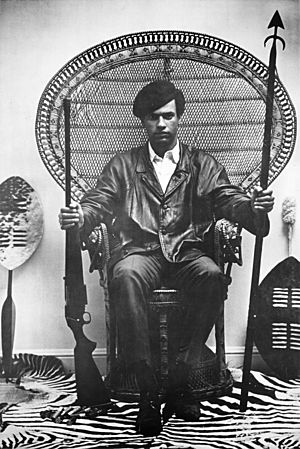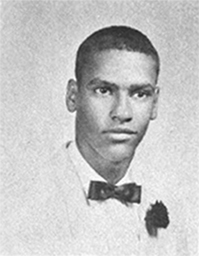Huey P. Newton facts for kids
Quick facts for kids
Huey P. Newton
|
|
|---|---|

Newton c. 1968
|
|
| Born |
Huey Percy Newton
February 17, 1942 Monroe, Louisiana, U.S.
|
| Died | August 22, 1989 (aged 47) Oakland, California, U.S.
|
| Education | Merritt College San Francisco Law School University of California, Santa Cruz (BA, MA, PhD) |
| Occupation | Activist |
| Years active | 1963–1969 |
| Organization | Black Panther Party |
| Known for | Founding the Black Panther Party |
| Spouse(s) |
Gwen Fontaine
(m. 1974; div. 1983)Fredrika Newton
(m. 1984) |
| Children | 4 |
Huey Percy Newton (born February 17, 1942 – died August 22, 1989) was an African-American leader and activist. He is best known for helping to create the Black Panther Party. Newton was seen as the main leader of this important group.
Contents
Early Life and Education
Huey Newton was born in Monroe, Louisiana, in 1942. He was the youngest of his parents' children. His father was a sharecropper, which means he farmed land owned by someone else and paid rent with a share of his crops.
His family moved to Oakland, California, as part of the Great Migration. This was when many African-Americans moved from the Southern United States to the North and West. The Newton family was poor but always had food and a home. Huey felt ashamed of being black while growing up in Oakland.
Newton finished Oakland Technical High School in 1959. He then went to Merritt College, where he earned a degree in 1966. He also studied at San Francisco Law School and the University of California, Santa Cruz. At Santa Cruz, he earned a bachelor's degree. Later, in 1980, he earned a PhD in social philosophy from the same university.
Founding the Black Panther Party
While at Merritt College, Newton became active in local politics. He learned a lot about black history. He also read books by famous thinkers like Karl Marx and Malcolm X.
In October 1966, Newton met Bobby Seale. Together, they started the Black Panther Party for Self Defense. Seale became the chairman, and Newton became the minister of defense. This group was for African-Americans and believed in the right of self-defense. Their ideas were greatly shaped by Malcolm X. The Black Panther Party became famous for its role in the Black Power movement.
Under Newton's leadership, the Black Panther Party created many community programs. These were called survival programs and helped people in need. They included food banks, medical clinics, and free tests for sickle cell anemia. They also offered legal advice and helped families visit relatives in prison.
One of their most famous programs was the Free Breakfast for Children program. This program fed thousands of poor children every day. Newton also helped start the Black Panther newspaper. It became one of the most widely read African-American newspapers in the country.
The party's goals were written in their Ten-Point Program. This plan asked for better housing, jobs, and education for African-Americans. The group believed that showing strength might be needed to bring about social change. For example, they once went to the California Legislature with guns to protest a new gun law.
Newton often visited places where black people gathered, like pool halls and bars. He wanted to teach people about their right to self-defense. He felt that black people were treated unfairly because they didn't know their rights. He wrote in his autobiography that he didn't know his rights until he studied law.
Newton also tried to turn everyday struggles into political actions. He wanted to help people use their daily activities to make big changes in their communities. However, some illegal actions by a few members later caused the party to lose support.
"Free Huey!" Campaign
In 1967, Newton was involved in a shooting incident. A police officer died, and Newton and another officer were injured. In 1968, Newton was found guilty of voluntary manslaughter. He was sentenced to 2 to 15 years in prison.
The Black Panther Party quickly started a campaign to get Newton released. They worked with the Peace and Freedom Party, a group that was against the war. This alliance helped Newton's cause and made the Black Panther Party more well-known.
On Newton's birthday, February 17, 1968, 5,000 people protested in Oakland. They supported Newton and got attention from news around the world. The phrase "Free Huey!" became their rallying cry. It was printed on buttons and T-shirts. A Black Panther leader, Kathleen Cleaver, said the campaign wanted to make Newton a symbol of the Black Panther Party's beliefs.
Newton's trial began on July 15. It became a big political movement about race. Over two years, the groups kept supporting Newton through his trial and appeals. Finally, the charges were dropped, and Newton was released on August 5, 1970.
Visit to China
After his release from prison in 1970, Newton was invited to visit the People's Republic of China. He decided to go before President Nixon's planned visit in 1972. Newton traveled to China in September 1971 with other Panthers and stayed for 10 days.
At every airport in China, thousands of people greeted Newton. They waved copies of the "Little Red Book," which contained sayings from Mao Zedong. They also held signs that supported the Black Panther Party.
During his trip, Newton met with ambassadors from North Korea and Tanzania. He also met with groups from North Vietnam and the Provisional Revolutionary Government of South Vietnam. Newton had two meetings with Chinese premier Zhou Enlai, but not with Chairman Mao. Newton described China as "a free and liberated territory with a socialist government."
After Newton's trip to Asia, the Black Panther Party started to include ideas from North Korea's Juche philosophy in their beliefs.
Writing and Scholarship
Huey Newton earned a bachelor's degree from the University of California, Santa Cruz in 1974.
He later earned a PhD in social philosophy from the same university in 1980. His PhD paper was called War Against the Panthers: A Study of Repression in America. It looked at important events and features of the Black Panther Party.
Newton's wife, Fredrika Newton, later talked about his academic work on a TV program in 2006. Newton also helped write the Party's ten-point manifesto with Bobby Seale in 1966.
Death
In 1989, Huey Newton was killed in Oakland, California. Tyrone Robinson, a member of the Black Guerrilla Family, was found guilty of his murder in 1991. Robinson was sentenced to 32 years to life in prison.
Newton's funeral was held at Allen Temple Baptist Church. About 1,300 people attended inside, and hundreds more listened outside. People celebrated Newton's work for civil rights and his efforts to help black children and families through the Black Panther Party. Newton was cremated, and his ashes were buried at Evergreen Cemetery in Oakland.
Thanks to his wife, Fredrika Newton, a statue of Huey Newton was put up in Oakland on February 17, 2021. This was near where he was killed. A special plaque, "Dr. Huey P. Newton Way," was also placed on that part of 9th Street.
See also
 In Spanish: Huey Newton para niños
In Spanish: Huey Newton para niños
- The Black Panthers: Vanguard of the Revolution
- Eldridge Cleaver
- COINTELPRO
- Angela Davis
- George Jackson
- New Left
- Soledad Brothers
- White Panther Party
- Young Lords
 | Stephanie Wilson |
 | Charles Bolden |
 | Ronald McNair |
 | Frederick D. Gregory |


